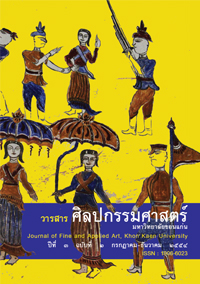ผลิตภัณฑ์จักสานกระจูดในจังหวัดนครศรีธรรมราช
Main Article Content
Abstract
ผลิตภัณฑ์จักสานของไทยเป็นศิลปะชาวบ้าน ที่มนุษย์คิดขึ้นเพื่อใช้สอยในชีวิตประจำวัน โดยทำขึ้นจากวิธีการ จัก สาน ถัก ทอ จากวัสดุที่หาได้ง่ายในท้องถิ่น แสดงออกมาในรูปแบบของศิลปะ เพื่อตอบสนองอารมณ์ ความนึกคิด และนำไปสู่การใช้งานได้ด้วย มูลเหตุสำคัญที่ทำให้เกิดผลิตภัณฑ์จักสานขึ้น คือ ความจำเป็นในการดำรงชีวิต สิ่งแวดล้อมทางธรรมชาติตามภูมิศาสตร์ ความเชื่อ ขนบประเพณี และศาสนา ผลิตภัณฑ์จักสานกระจูด เป็นสินค้าหนึ่งตำบลหนึ่งผลิตภัณฑ์ของจังหวัดนครศรีธรรมราช ซึ่งเป็นที่รู้จักของคนทั่วไปทั้งประเทศ โดยแหล่งวัตถุดิบและการผลิตที่สำคัญอยู่ที่ ตำบลเคร็ง อำเภอชะอวด จังหวัดนครศรีธรรมราช มีกระบวนการผลิตเริ่มต้นตั้งแต่เตรียมกระจูดเพื่อใช้สาน การคัดขนาด การผึ่งแดด การย้อมสี และการสาน ลายสานที่นิยมกันโดยทั่วไปคือ ลายสอง รูปแบบของผลิตภัณฑ์จักสานกระจูดที่มีอยู่แบ่งได้เป็น 2 ประเภท คือ 1.ประเภทดั้งเดิม ประกอบด้วยเสื่อและกระสอบ 2.ประเภทพัฒนาส่งเสริม มีพัฒนาการ 3 ชนิด ด้วยกัน ได้แก่ 1.) การนำ เสื่อกระจูดมาตัดเย็บเป็นผลิตภัณฑ์ เสริมด้วยกระดาษแข็ง เข้าขอบและขึ้นรูปด้วยการกุ๊นริมด้วยผ้า เช่น กระเป๋าสุภาพสตรี 2.) การขึ้นรูปด้วยการสานโดยใช้โครงสร้างในตัวเองยึดเกาะกันด้วยแรงขัด เช่น กระสอบ 3.) ผลิตภัณฑ์ที่ได้รับการออกแบบและประยุกต์ เป็นผลิตภัณฑ์ที่เกิดจากการปรับปรุงรูปแบบตามความคิดสร้างสรรค์ของชุมชนเอง เช่น กระเป๋าสุภาพสตรีหลากหลายรูปแบบ บรรจุภัณฑ์ ชิ้นส่วนของเครื่องเรือน เป็นต้น ส่วนรูปแบบผลิตภัณฑ์ที่เป็นเอกลักษณ์ของชุมชนได้แก่ เสื่อ กระสอบใส่ของสารพัดประโยชน์ และกระเป๋าสุภาพสตรี จึงง่ายสำหรับการพัฒนารูปแบบและต่อยอดทางความคิดของทุกหน่วยงาน ซึ่งส่วนใหญ่พัฒนากระเป๋าหลากหลายรูปแบบแล้วแต่ความนิยมของกลุ่มผู้บริโภค เพื่อให้สอดคล้องกับบริบทของสังคมที่เปลี่ยนแปลง ทางด้านการอนุรักษ์สิ่งแวดล้อม แนวโน้มการบริโภควัสดุที่ผลิตจากธรรมชาติ การผสมผสานกับวัสดุสมัยใหม่ และการมีส่วนร่วมในการคิดประยุกต์รูปแบบของผลิตภัณฑ์ด้วยตัวเองของผู้บริโภค ซึ่งจะทำให้การสืบสานหัตถกรรมท้องถิ่นคงอยู่คู่กับวิถีชีวิตของคนไทยต่อไป
Krachud Basketry Product in Nakhon Si Thammarat
The weaves products of Thailand is villagers arts, at a human create to utility in the everyday life, by the way weaving and knitting from the inventory that get easy in the locality, express come to the arts, respond the temper, think, and bring about to the usability. Important cause is born the products weaves, to be the necessity in the living, natural environment follows geography, belief, tradition, and religion. Krachud basketry product are one of the well known handicrafts OTOP (One Tambon One Product) in Nakhon Si Thammarat. The villagers in Kreng-substrict, Cha-uad district, Nakhon Si Thammarat are the most famous in producing Krachud products, there is the procedure produces initial since materials prepare for use to weave, size select, sunning, dyeing and weaving, stripes weaves that like to generally is Lai Song, the format of Krachud basketry product that exists can divide 2 kind; 1. Original kind, compose a mat and sack, 2. Develop and encourage kind, there are 3 type developments, for example 1.) Krachud mat cut out the products, add with cardboard, reach the edge and formed to hem with cloth, such as a lady bag, 2.) formed with the weaving by structure in oneself hold together such as a sack, 3.) products that have to design and applied, products is adaptation follows the creativity of the community by oneself, such as a various of lady bags, packaging, a part of furniture etc., the identity of the community products for example mat, a multi-purpose sack and lady bag, then easy to design product and development of every institute, the majority develops various bag depend upon the favor consumer group, for conform to the context of the social modify of environment conservation, tendency that product from nature, integration of modern materials, and participating in applied and design products with oneself of a consumer, which make handicraft locality inheritance remain the way of Thai life.
Article Details
Content and information in articles published in the Journal of Fine and Applied Arts of Khon Kaen University is regarded as the opinion and sole responsibility of the author(s) directly; therefore, editors are not obliged to agree to or share any responsibility with regard to the content and information that appears within these articles.
All articles, information, content, image, etc. that have been published in the Journal of Fine and Applied Arts of Khon Kaen University is the copyright of the Journal of Fine and Appllied Arts of Khon Kaen University. Any person or organization who wishes to distribute all or parts of the articles for further dissemination or other usage must first receive permission from the Journal of Fine and Applied Arts of Khon Kaen University before proceeding to do so.


